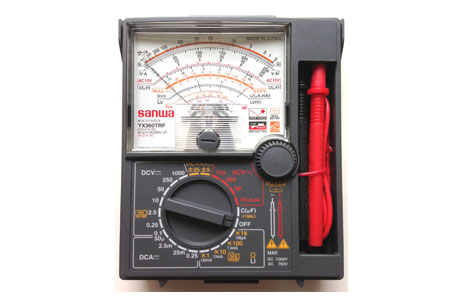What Is The Difference Between A Multimeter And A Voltmeter?
Key Takeaway
The main difference between a multimeter and a voltmeter is their functionality. A voltmeter is a specialized tool used only to measure voltage in a circuit. In contrast, a multimeter is versatile and can measure voltage, current, resistance, and sometimes other parameters like capacitance or frequency.
A multimeter can function as a voltmeter, ohmmeter, or ammeter, making it ideal for various applications. Voltmeters are generally simpler, more compact, and less expensive, but they are limited to voltage measurements. Multimeters, while bulkier and pricier, are more comprehensive tools. Additionally, multimeters can measure both AC and DC signals, check components like diodes and transistors, and calculate circuit resistance directly, which a voltmeter cannot.
Introduction to Multimeters and Voltmeters: An Overview
A multimeter is a versatile device capable of measuring multiple electrical parameters, such as voltage, current, and resistance. It’s like having several instruments combined into one compact tool.
On the other hand, a voltmeter is specialized for measuring voltage across two points in a circuit. It’s simpler in design and focuses solely on voltage readings, whether for direct current (DC) or alternating current (AC).
Key Differences at a Glance:
Multimeter: A multifunctional tool used for diagnosing and troubleshooting.
Voltmeter: A single-purpose instrument for precise voltage measurements.
Understanding these fundamental differences sets the stage for deeper insights into their functionality and applications.

An Overview H2: Functional Differences: Multimeter vs. Voltmeter
While both tools measure electrical parameters, their core functionality differs significantly.
Multimeter:
Designed for versatility, a multimeter combines the capabilities of a voltmeter, ammeter, and ohmmeter.
Available in digital and analog versions, with digital multimeters offering features like auto-ranging and data hold.
Ideal for diagnosing complex circuits where multiple parameters need to be tested simultaneously.
Voltmeter:
Specializes in measuring voltage with high precision.
Analog voltmeters use a needle to indicate voltage, while digital voltmeters display exact numerical values.
Best suited for applications that require consistent voltage monitoring without additional functionalities.
For new engineers, the choice between a multimeter and a voltmeter often comes down to the scope of the task. If you need a tool for occasional use or single-parameter testing, a voltmeter might suffice. For more complex projects, a multimeter is indispensable.
Functional Differences: Multimeter vs. Voltmeter H2: Measurement Capabilities: Voltage, Current, Resistance, and More
Measurement capabilities are where the multimeter truly outshines the voltmeter.
Multimeter:
Voltage: Measures both AC and DC voltage accurately.
Current: Includes functionality for low (mA) and high (A) current measurements.
Resistance: Tests resistance in components and circuits.
Continuity and Diodes: Many multimeters include modes to test circuit continuity and diode functionality.
Voltmeter:
Focused exclusively on voltage measurement.
While accurate for this purpose, it lacks the ability to measure current or resistance.
Practical Example:
Imagine you’re troubleshooting a motor circuit. A multimeter allows you to measure the voltage at the terminals, check the current through the motor, and test the resistance of its windings—all with one tool. A voltmeter, in contrast, would only measure the voltage.
For engineers working in dynamic environments, the expanded capabilities of a multimeter make it a better choice for versatility and convenience.
Multimeter vs. Voltmeter H2: Measurement Capabilities: Voltage, Current, Resistance, and More H2: Use Cases: When to Choose a Multimeter or a Voltmeter
Choosing between a multimeter and a voltmeter depends on the task at hand.
When to Use a Multimeter:
Troubleshooting Circuits: Identify faults in wiring, components, or power supply by testing multiple parameters.
Testing Batteries: Measure voltage, resistance, and current draw simultaneously to diagnose battery health.
Home Repairs: Use it for tasks like testing outlets, light fixtures, or appliances.
Industrial Maintenance: Diagnose motors, transformers, and control panels.
When to Use a Voltmeter:
Voltage Monitoring: Ideal for continuous or precise voltage measurement in a stable circuit.
Laboratory Experiments: Analog voltmeters are often preferred in educational settings for visualizing voltage changes.
Simple Diagnostics: Quick voltage checks in low-complexity circuits.
For routine diagnostics or testing, a voltmeter might be sufficient. However, for comprehensive analysis or maintenance, the multimeter is the clear winner.
Measurement Capabilities: Voltage, Current, Resistance, and More H2: Use Cases: When to Choose a Multimeter or a Voltmeter H2: Price and Portability Comparison Between Multimeters and Voltmeters
The cost and portability of these tools can also influence your choice.
Multimeter:
Price: Typically more expensive due to its multifunctionality. Basic models are affordable, but high-end multimeters with advanced features can be costly.
Portability: Compact and lightweight, multimeters are designed for easy transport and versatile use in various environments.
Voltmeter:
Price: More affordable, especially analog versions, since they focus on a single parameter.
Portability: Equally compact and portable, but their limited functionality makes them less versatile in the field.
For engineers on a budget or those needing a simple tool, a voltmeter is an economical choice. However, a multimeter’s cost is justified by its expanded capabilities, making it a better long-term investment for professionals.
Conclusion
The difference between a multimeter and a voltmeter lies in their functionality, measurement capabilities, and applications. While a voltmeter is perfect for simple, precise voltage measurements, a multimeter offers versatility, making it suitable for a wide range of tasks, from diagnosing circuits to maintaining industrial equipment.
For new engineers, understanding these differences helps you choose the right tool for the job. If your work involves measuring multiple parameters or troubleshooting complex systems, a multimeter is your go-to device. For focused voltage monitoring, a voltmeter remains a reliable option. Both tools have their place, and selecting the right one ensures efficiency and accuracy in your electrical work.

